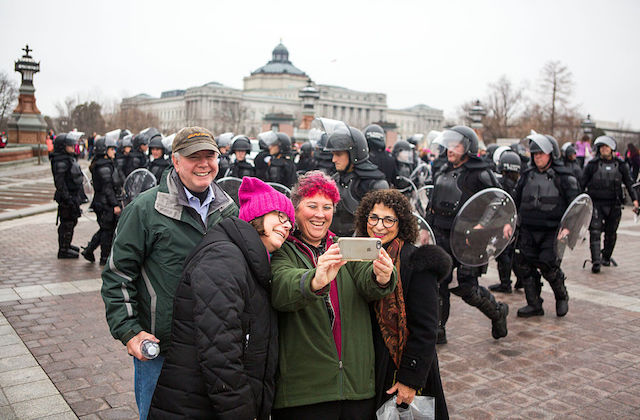READ: Why It's Dangerous to Celebrate the Lack of Arrests at the Women's March on Washington

Much has been made about reports that there were no arrests in D.C. during the Women’s March on Washington. But an essay from Jess Zimmerman posted on New Republic today (January 24) breaks down for readers why this says more about the intersection of racism and sexism than it does about the behavior of the protestors.
The high-fives of cops at the Women’s March and the blows raining down on BLM are the front and back of the same hand. If you think their uncharacteristic gentleness is a testament to your good behavior, think again. It comes from the same root as their violence: from the conviction that you are a delicate, breakable, and unthreatening thing….
Yes, the marchers on Saturday were well-behaved. But when has that ever mattered? John Lewis was beaten nearly to death for marching across a bridge in Selma. Ieshia Evans stood bare-armed and weaponless as police in body armor lunged towards her with plastic cuffs in Baton Rouge. If the cops want to arrest a protester, they will gladly turn her into a criminal—ordering her to disperse while making it physically impossible, for instance, or searching her with or without consent in an attempt to turn up something illegal. (At the march on Washington, organizers said that bags larger than 8 x 6 x 4 were not allowed. Many marchers carried larger bags under their coats. If any cops had checked, they could have had an excuse to detain us, but nobody did.) Bad behavior is enough to lead to arrests, but good behavior isn’t enough to avoid it. If the cops didn’t arrest anyone, it’s because they didn’t want to.
A glance at any Women’s March photo will give you a clue to the reason. Underneath those pink hats were a lot of white faces—a stark reminder of the 53 percent of white women who voted for Trump, as one protester [Angela Peoples, co-director at GetEQUAL] reminded everyone with a sign that later went viral. The average marcher did not look like John Lewis, or like Ieshia Evans. The average marcher looked like me—a white lady. If I don’t look like someone a cop wants to arrest, that’s not a testament to my law-abiding goodness, or the cop’s. It’s a testament to how sexism in this country fuels racism, and vice versa. It’s a testament to exactly what we need to resist.
She goes on to challenge White women to use their privilege to advance causes that impact people of color.
Effective protest does not require anyone having their head cut off. But it does require recognizing that this zero-arrest protest wasn’t something a largely white and female crowd earned. It was given to us, whether we asked for it our not, because of our frailty. Because we are something to be protected, not a serious threat. Because our safety has been the engine of our oppression and the oppression of others. We owe it to ourselves, and to those others, to use this gift wisely. If the police stay their hand with you, white women, it is not a compliment. It is condescension. But it is also an opportunity. How will you use it?
Read the full essay here.
